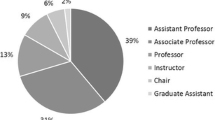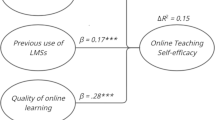Abstract
With the rapid increase in online education enrollments, the need for experienced and skilled online instructors has also increased. Research confirms that novice online instructors encounter barriers to high-quality teaching, including a lack of pedagogical knowledge, skills, and low self-efficacy. Providing training and mentoring within the real-life classroom settings that novice instructors will teach, may increase novice instructors’ technical and pedagogical skills, teaching confidence (i.e., self-efficacy), and transfer of training to independent teaching. In this manuscript, the authors present a design case of an online mentoring professional development program in an authentic and real-life context to improve new online instructors’ pedagogical skills and self-efficacy for real-world transfer. To date, the mentoring program has graduated 13 mentees, with one currently still in the program. Of the 13 instructors who completed the program, 12 are currently teaching regularly for the online program.


Similar content being viewed by others
References
Ali, N. S., Hodson-Carlton, K., Ryan, M., Flowers, J., Rose, M. A., & Wayda, V. (2005). Online education: Needs assessment for faculty development. The Journal of Continuing Education in Nursing, 36(1), 32–38.
Al-Salman, S. M. (2013). The role of faculty in the effectiveness of fully online programs. (Doctoral Dissertation). Retrieved from ProQuest at http://gradworks.umi.com/35/65/3565063.html. Accessed 9 Sept 2019
Bailie, J. (2011). Effective online instructional competencies as perceived by online university faculty and students: A sequel study. Journal of Online Learning and Teaching, 7(1), 82–89.
Banas, J. R., & York., C. S. (2014). The impact of authentic learning exercises on pre-service teachers’ motivational beliefs towards technology integration. International Journal of Information and Communication Technology Education, 10(3), 60–76.
Bandura, A. (1977). Self-efficacy: Toward a unifying theory of behavioral change. Psychological Review, 84(2), 191–215.
Bandura, A. (1982). Self-efficacy mechanism in human agency. American Psychologist, 37(2), 122–147.
Bandura, A. (1995). Exercise of personal and collective efficacy in changing societies. In A. Bandura (Ed.), Selfefficacy in changing societies (pp. 1–45). Cambridge University Press.
Baran, E., Correia, A.-P., & Thompson, A. (2011). Transforming online teaching practice: Critical analysis of the literature on the roles and competencies of online teachers. Distance Education, 32(3), 421–439.
Baran, E., Correia, A., & Thompson, A. D. (2013). Tracing successful online teaching in higher education: Voices of exemplary online teachers. Teachers College Record, 115, 1–41.
Bartimote-Aufflick, K., Bridgeman, A., Walker, R., Sharma, M., & Smith, L. (2016). The study, evaluation, and improvement of university student self-efficacy. Studies in Higher Education, 41(11), 1918–1942.
Bektas, M. (2019). Examining the teacher candidates’ metaphorical perceptions related to the notion of authentic learning. International Online Journal of Educational Sciences, 11(2), 81–99.
Boling, E. (2010). The need for design cases: Disseminating design knowledge. International Journal of Designs for Learning, 1(1), 1–8.
Ching, Y.-H., Hsu, Y. C., & Baldwin, S. (2018). Developing online teaching expertise: An analysis of prospective online instructors’ reflections. Journal of Interactive Learning Research, 29(2), 145–168.
Clay, M. (1999). Development of training and support programs for distance educators. Online Journal of Distance Learning Administration, 2(3). https://www.learntechlib.org/p/90061/
Collins, A., Joseph, D., & Bielaczyc, K. (2004). Design research: Theoretical and methodological issues. Journal of the Learning Sciences, 13(1), 15–42.
Cronin, M., & Connolly, C. (2007). Exploring the use of experiential learning workshops and reflective practice within professional practice development for post-graduate health promotion students. Health Education Journal, 66, 286–303.
Darling-Hammond, L. (1999). Teaching quality and student achievement: A review of state policy evidence. University of Washington.
Darling-Hammond, L. (2000). Teacher quality and student achievement: A review of state policy evidence. Education Policy Analysis Archives, 8(1), 1–44.
Elliott, M., Rhoades, N., Jackson, C. M., & Mandernach, B. J. (2015). Professional development: Designing initiatives to meet the needs of online faculty. Journal of Educators Online, 12(1)
Ginder, S. A., Kelly-Reid, J. E., & Mann, F. B. (2019). Enrollment and Employees in Postsecondary Institutions, Fall 2017; and Financial Statistics and Academic Libraries, Fiscal Year 2017: First Look (Provisional Data) (NCES 2019–021rev). U.S. Department of Education. National Center for Education Statistics.
Gurley, L. (2018). Educators’ preparation to teach, perceived teaching presence, and perceived teaching presence behaviors in blended and online learning environments. Online Learning, 22(2), 197–220.
Hackett, G., & Betz, N. (1989). An exploration of the mathematics self-efficacy/mathematics performance correspondence. Journal for Research in Mathematics Education, 20(3), 261–273.
Hathaway, D., & Norton, P. (2012). An exploratory study comparing two modes of preparation for online teaching. Journal of Digital Learning in Teacher Education, 28(4), 146–149.
Herrington, J., & Oliver, R. (2000). An instructional design framework for authentic learning environments. Educational Technology Research and Development, 48(3), 23–48.
Herrington, J. A., Oliver, R. G., & Reeves, T. (2003). Patterns of engagement in authentic online learning environments. Australian Journal of Educational Technology, 19(1), 59–71.
Horvitz, B. S., Beach, A. L., Anderson, M. L., & Xia, J. (2015). Examination of faculty self-efficacy related to online teaching. Innovative Higher Education, 40(4), 305–316.
Howard, C. D. (2011). Writing and rewriting the instructional design case: A view from two sides. International Journal of Designs for Learning, 2(1), 41–56. https://doi.org/10.14434/ijdl.v2i1.1104
Howard, C. D., Boling, E., Rowland, G., & Smith, K. M. (2012). Instructional design cases and why we need them. Educational Technology, 52(3), 34–38.
Howard, S. K., Tondeur, J., Hutchison, N., Scherer, R., & Siddiq, F. (2022). A t(r)opical journey: Using text mining to explore teachers’ experiences in the Great Online Transition. Society for Information Technology & Teacher Education International Conference.
Kibaru, F. (2018). Supporting faculty to face challenges in design and delivery of quality courses in virtual learning environments. Turkish Online Journal of Distance Education, 19(4), 176–197.
Knobloch, N. A. (2003). Is experiential learning authentic? Journal of Agricultural Education, 44(4), 22–34.
Lackey, K. (2011). Faculty development: An analysis of current and effective training strategies for preparing faculty to teach online. Online Journal of Distance Learning Administration, 14(4), 1–27.
Larcara, M. (2011). Supporting the online adjunct in higher education: A Delphi study. In Proceedings of World Conference on E-Learning in Corporate, Government, Healthcare, and Higher Education 2011 (pp. 2387–2398). Chesapeake, VA: AACE.
Lave, J., & Wenger, E. (1991). Situated learning: Legitimate peripheral participation. Cambridge University Press.
Lederman, D. (2018). Online education ascends. Inside Higher Ed. https://www.insidehighered.com/digital-learning/article/2018/11/07/new-data-online-enrollments-grow-and-share-overall-enrollment. Accessed 9 Sept 2019
Lloyd, S. A., Byrne, M. M., & Mccoy, T. S. (2012). Faculty-perceived barriers of online education. MERLOT Journal of Online Learning and Teaching, 8(1), 1–12.
Lockwood, S. A., Miller, A. J., & Cromie, M. M. (2014). Preparing future biology faculty: An advanced professional development program for graduate students. The American Biology Teacher, 76(1), 17–21.
Lombardi, M. M. (2007). Authentic learning for the 21st century: An overview. Educause Learning Initiative, 1, 1–12.
Lowell, V. L., & Exter, M. (2017). Leading a collaborative effort: Providing effective training and support for online adjunct instructors. International Journal of Designs for Learning, 8(2), 59–79.
Lowell, V. L., & Ashby, I. V. (2018). Supporting the development of collaboration and feedback skills of instructional designers. Journal of Computing in Higher Education, 30(1), 1–21. https://doi.org/10.1007/s12528-018-9170-8
Maina, F. W. (2004). Authentic learning: Perspectives from contemporary educators. Journal of Authentic Learning, 1(1), 1–8.
Moon, B., & Robinson, B. (2003). Open and distance learning for initial teacher training. In B. Robinson & C. R. Latchem (Eds.), Teacher education through open and distance learning: A review of distance education and open learning (Vol. 3, pp. 72–90). London: RoutledgeFalmer.
Pajares, F., & Miller, M. (1994). Role of self-efficacy and self-concept beliefs in mathematical problem solving: A path analysis. Journal of Educational Psychology, 86(2), 193–203.
Pankowski, P. (2004). Faculty training for online teaching. T.H.E. Journal. https://thejournal.com/articles/2004/09/01/faculty-training-for-online-teaching.aspx. Accessed 9 Sept 2019
Redecker, C. (2017). European framework for the digital competence of educators. Publications Office of the European Union.
Reeves, T. C., Herrington, J., & Oliver, R. (2002). Authentic activities and online learning. In A. Goody, J. Herrington, & M. Northcote (Eds.), Quality conversations: Research and Development in Higher Education (Vol. 25, pp. 562–567). HERDSA.
Renzulli, J. S., Gentry, M., & Reis, S. M. (2004). A time and a place for authentic learning. Educational Leadership, 62(1), 73–77.
Robinson, K. S. (2017). How graduate teaching assistants experience teaching preparation for higher education: A symbolic interactionist study (Order No. 10753506). Available from ProQuest Dissertations & Theses Global. (2006947722).
Rockinson-Szapkiw, A. J., & Walker, V. L. (2009). Web 2.0: Facilitating interactivity and collaborative relationships in an online human service counseling skills course. Journal of Technology in Human Services, 27(3), 175–193. https://doi.org/10.1080/15228830903093031
Roman, T., Kelsey, K., & Lin, H. (2010). Enhancing online education through instructor skill development in higher education. Online Journal of Distance Learning Administration, 13(4), 1–9.
Rule, A. C. (2006). The components of authentic learning. Journal of Authentic Learning, 3(1), 1–10.
Schunk, D. (1985). Self-efficacy and classroom learning. Psychology in the Schools, 22(2), 208–223.
Schunk, D. (1999). Social-self interaction and achievement behavior. Educational Psychologist, 34(4), 219–227.
Schunk, D., Hanson, A., & Cox, P. (1987). Peer-model attributes and children’s achievement behaviors. Journal of Educational Psychology, 79(1), 54–61.
Seaman, J. E., Allen, I. E., & Seaman, J. (2018). Grade Increase: Tracking Distance Education in the United States. Babson Survey Research Group.
Smith, K. M. (2010). Producing the rigorous design case. International Journal of Designs for Learning, 1(1), 9–20.
Song, M. (2019). Learning online for teaching online: A formative program evaluation of a hybrid faculty training program [Document No. 13901617] [Doctoral dissertation, University of Pittsburgh]. Proquest Dissertations Publishing.
Usher, E. L., & Pajares, F. (2008). Sources of self-efficacy in school: Critical review of the literature and future directions. Review of Educational Research, 78(4), 751–796.
Van Dinther, M., Dochy, F., & Segers, M. (2011). Factors affecting students’ self-efficacy in higher education. Educational Research Review, 6(2), 95–108.
Vinlove, K. (2011). A model for continuous training and mentoring of adjunct business faculty. (Manuscript NC11066). Park University, Parkville, MO.
Walker, V. L. (2009). 3D virtual learning in counselor education: Using second life in counselor skill development. Journal of Virtual World Research, 2(1). https://journals.tdl.org/jvwr/article/view/423/463
Walker, V. L., & Rockinson-Szapkiw, A. J. (2009). Educational opportunities for clinical counseling simulations in second life. Innovate: Journal of Online Learning, 5(5). http://nsuworks.nova.edu/innovate/vol5/iss5/
Weaver, D., Robbie, D., & Borland, R. (2008). The practitioner’s model: Designing a professional development program for online learning. International Journal on ELearning, 7(4), 759–774.
Williams, L. S. (1991). The effects of a comprehensive teaching assistant training program on teaching anxiety and effectiveness. Research in Higher Education, 32(5), 585–598.
Yang, M., Lowell, V. L., Talafha, A., & Harbor, J. (2020). Transfer of training, trainee’s attitudes and best practices in training design: A multiple-case study. TechTrends, 64(1). https://doi.org/10.1007/s11528-019-00456-5
Zimmerman, B. (2000). Self-efficacy: An essential motive to learn. Contemporary Educational Psychology, 25(1), 82–91. https://doi.org/10.1006/ceps.1999.1016
Zimmerman, B. (2002). Becoming a self-regulated learner: An overview. Theory into Practice, 41(2), 64–70.
Author information
Authors and Affiliations
Corresponding author
Ethics declarations
Declarations
The authors have no potential conflicts of interest; the authors have no relevant financial or non-financial interests to disclose; the authors confirm a human subject review protocol was approved and followed for this study.
Additional information
Publisher's Note
Springer Nature remains neutral with regard to jurisdictional claims in published maps and institutional affiliations.
Supplementary Information
Below is the link to the electronic supplementary material.
Rights and permissions
Springer Nature or its licensor holds exclusive rights to this article under a publishing agreement with the author(s) or other rightsholder(s); author self-archiving of the accepted manuscript version of this article is solely governed by the terms of such publishing agreement and applicable law.
About this article
Cite this article
Lowell, V.L., Yang, M. Authentic Learning Experiences to Improve Online Instructor’s Performance and Self-Efficacy: The Design of an Online Mentoring Program. TechTrends 67, 112–123 (2023). https://doi.org/10.1007/s11528-022-00770-5
Accepted:
Published:
Issue Date:
DOI: https://doi.org/10.1007/s11528-022-00770-5




